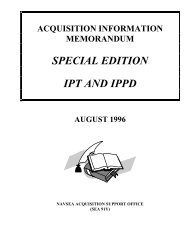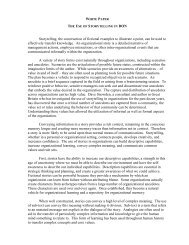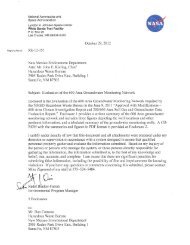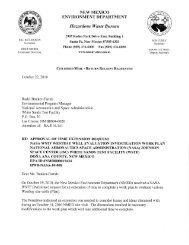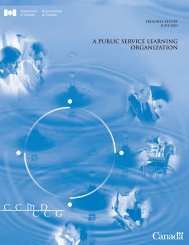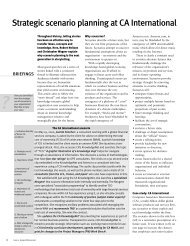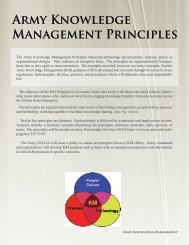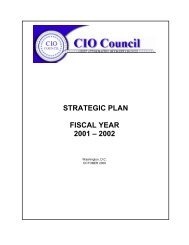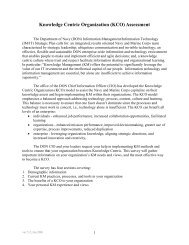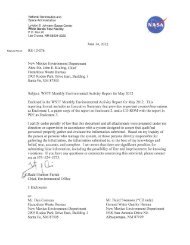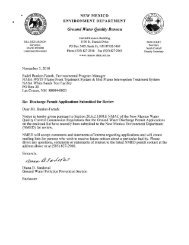NAVAL AVIATION SYSTEMS - NASA Wiki
NAVAL AVIATION SYSTEMS - NASA Wiki
NAVAL AVIATION SYSTEMS - NASA Wiki
You also want an ePaper? Increase the reach of your titles
YUMPU automatically turns print PDFs into web optimized ePapers that Google loves.
CHAPTER X: CONFIGURATION MANAGEMENT<br />
PART B: ENGINEERING CHANGE PROPOSAL PROCESS<br />
Flow Process: ECP Approval Process<br />
NAVAIR, Contractor, CFA NAVAIR NAVAIR PM issues decision<br />
hold strategy and requests receives memo (DM) based on<br />
technical meetings ECP ECP ECP evaluation mtg<br />
(Program Planning Conferences)<br />
PM, AIR-4.1 and AIR-3.1<br />
prepare CCB request, PM verifies acceptability PM presents<br />
coordination and staffing and funds availability CCB request<br />
in accordance with DM<br />
to CCB<br />
CCB PM, AIR-4.1, AIR-3.1, AIR-2.1, TDSA/MESMS<br />
approval ACO, ASO, NATSF, CFA, others are updated<br />
implement change<br />
Purpose: Engineering Change Proposals (ECPs) are requested from contractors, Naval Aviation Depots<br />
(NADEPs), or other cognizant field activities for incorporation of changes into weapon systems and equipmentís<br />
for operational improvements, safety, and correction of deficiencies.<br />
Source Documentation/Guidance: MIL-STD-973, Configuration Management, of 17 Apr 1992; NAVAIRINST<br />
4130.1C, NAVAIR Configuration Management Policy, of 31 Jan 1992; and Management Guide: Contractor-Navy<br />
Coordination Requirements for Effective Management of Engineering Change Proposals (ECPs), 4th edition, Oct<br />
1992.<br />
Critical Prior Events: Conduct engineering investigations to define the scope of the change and find possible<br />
solutions to meet the identified requirement. Hold working meetings with contractors and cognizant field<br />
activities, logistics managers, and program management personnel to definitize the change and establish an<br />
acquisition strategy and plan. PM initiates the Program Funding Change Proposal (PFCP) and budget process.<br />
The AIR-4.1 engineer drafts PCO letter requesting ECP. The PM ensures that there is an approved PFCP (if<br />
required), a decision memorandum, and a fully staffed CCB request, including logistics impact, prior to submitting<br />
the ECP to the Change Control Board (CCB) for approval. Maximum use should be made of the ECP<br />
Management Guide for request, preparation, and approval phases for ECPs to ensure effective accomplishment of<br />
the above events. The ECP Management Guide is available from AIR-1.3.3.<br />
Critical Post Events: After CCB approval, formal implementation action is needed to initiate activities required to<br />
design, develop, test, incorporate, and support the change. The approved CCB change request/directive (NAVAIR<br />
Form 13050/2) is the Procurement Initiation Document (PID) used by NAVAIR contracts (AIR-2.0) for<br />
implementing the change. The cognizant logistic manager will ensure that an implementation letter is issued<br />
which covers all areas affected by the ECP. This letter will state the NAVAIR CCB decision, delineate approved<br />
implementation actions, state what actions the NAVAIR PCO will accomplish (if applicable) and provide the ACO<br />
or field activity with required information to enable issuance of orders/authorizations for designated actions. The<br />
implementation letter will clearly identify what we are buying and the appropriate contract/BOA line items or<br />
AIRTASK/WORK REQUEST which will be used. It will also include complete DD Form 1423 information for<br />
deliverable contract data requirements, PCO authorization (Sole Source Authorization) and will identify the<br />
funding documents to be used. The number and date for each funded task must be clearly stated in the<br />
implementation letter. The Modification Management Information System (MODMIS) managed by AIR-3.1.8<br />
must also be updated to reflect the CCB approved ECP Implementation Plan.<br />
43



